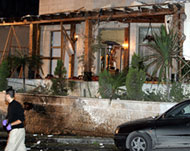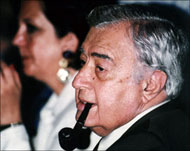An Arab American director’s legacy
Moustapha Akkad, ebullient director of the epic film about the rise of Islam, The Message, died in a Jordanian hospital due to injuries from a bomb blast at the Grand Hyatt hotel in Amman.

Akkad had been in Jordan to attend a wedding in the port city of Aqaba and his daughter had arrived from Beirut to meet him. She also perished in the blast.
It was only two years ago that I sat across from him and his son, Malek, as he discussed the challenges he was facing in arranging financing for his new epic project – Salahuddin.
Sitting comfortably in a leather chair in the lobby of the Grand Hyatt in Cairo, Egypt, with a pipe in his hand, Akkad described his Salahuddin troubles as nearly synonymous to the challenges he faced when trying to put together a script for The Message – a film about the rise of Islam and the teachings of the Prophet Muhammad.
It was 1976 and Akkad had been shuttling back and forth between Beirut, Cairo and Riyadh to get various Islamic schools of jurisprudence to sign on to the project.
In Beirut, Shia scholars agreed to the script, which was written by writer Hal Craig; in Cairo, the revered Al Azhar Mosque clerical establishment also gave the project a green light.
But it was in Saudi Arabia that Akkad met the most difficulty. Some Saudi scholars he met thought the idea of a film was diabolical. He engaged in many philosophical discussions with the clerical order in the kingdom but they would not budge.
 |
|
Blasts hit three luxury hotels in |
It was only with the influence of some in the Saudi court that Akkad finally got approval to start filming.
“I told them that with their way of thinking, they would have to change,” Akkad told me in Cairo in November 2003.
“Or they will be changed.”
Salahuddin – Muslim hero
Akkad faced similar obstacles in getting Arab financial backing for his Salahuddin project. He had already got the iconic Sean Connery on board to star as the legendary Kurdish hero born in Iraq who would reclaim Jerusalem from the Crusaders in the 12th century.
Akkad thought the invasion of Iraq was analogous to the political climate in the 11th century before Jerusalem was sacked. He said the current geopolitical chessboard reminded him of all the Muslim city-states which colluded with the Crusaders and allowed not only the fall of Jerusalem, but also led to Muslim infighting.
He believed he was unable to gain Arab financial backing because the period leading up to the rise of Salahuddin too closely mirrored current events in the Arab world.
The last I had heard was that Akkad had found some financial backing and Connery was still interested in the project.
Desert beauty
Connery was an ideal choice for the part, Akkad had said. That started a discussion into the true stars of Hollywood: Gregory Peck, Gary Cooper, Henry Fonda, Anthony Quinn,who starred in two of Akkad’s films.
We went through a host of acclaimed Hollywood glitterati until Akkad ended up talking about his favourite director, David Lean.
Lean, the genius behind The Bridge on the River Kwai (1957), Lawrence of Arabia (1962) and Doctor Zhivago (1965), would be one of Akkad’s muses, his inspiration to take up filmmaking as a craft.
In 1976’s The Message, the viewer is witness to long, contemplative shots of the desert and its enchanting, often beguiling beauty. The cinematography is a tip of the hat to Lean who in Lawrence of Arabia used wide desert shots to pull the viewer into the sands of Arabia and the heart of the Arab rebellion.
 |
|
Akkad was best known for his |
Interestingly, Quinn, who starred alongside Peter O’Toole and Omar Sharif in Lawrence, was the star of both The Message and 1979’s Lion of the Desert, or as it is popularly known in the Arab world, Omar Mukhtar.
A story of the legendary Libyan teacher who took up arms against the Italian invaders in the 1920s, Lion of the Desert was in Akkad’s words, his finest achievement as a filmmaker.
With a star-studded cast including Oliver Reed as Italian General Graziani, Rod Steiger as Mussolini and Irene Papas (also a star of The Message) as Mabrouka, the film won rave reviews in the Arab world but received little attention in Hollywood.
Akkad told me the film fell prey to the popular politics of the times; Libyan leader Muammar Qadhafi had provided some financial backing to the film and allowed it to be filmed in Libya, which was considered an enemy of the US in the late 1970s.
The animosity between US president Ronald Reagan’s administration and Libya in the 1980s meant the film got very little play in American theatres or on television networks.
Horror meister
But Akkad remained popular among American critics and moviegoers partly because of his chance, and little-known, decision to executive produce a horror story about a deranged slasher called Michael Myers.
Myers, the antithesis of all superheroes, the bogeyman personified, was the main character in John Carpenter’s twisted play on the spook theme associated with Halloween.
Carpenter had been shopping this tale of the masked menace when Akkad happened upon it and decided to executive produce.
It was the autumn of 1978 and America had no idea the horror that was coming its way.
Twenty-seven years and some seven sequels later, Akkad and Carpenter had together created the single most commercially successful horror franchise in movie history.
Halloween (and the story of Michael Myers) was to the horror film genre what Star Wars was to science fiction in the 1970s. Both sparked copycat films and influences and both sparked comedic spoofs.
Akkad had told me how moviegoers flock to horror films partly because scared girls would grab on to their boyfriends. We both laughed about that one.
There were plans to have Myers return in Halloween 9, but one can only speculate as to the future of the franchise now.
Aleppo, ah Aleppo
Although a naturalised American citizen, Akkad always kept Syria, and specifically his birth town of Aleppo, sacrosanct. I had asked him what it meant to be so far away and he had replied: “Aleppo is never far away, it is always in the heart”.
He shared fond memories of Syria, its people, the way he was brought up as a Muslim and as an Arab, the parables told to him by his father.
He was very passionate in describing his love for his religion and Arab causes and his disdain for terrorism.
Ironically, it would be terrorism that would end his life.
“Nothing, no one can kill Michael Myers,” Akkad told me once.
“There will always be Michael Myers.”
To the millions of his film fans there will always be Moustapha Akkad.